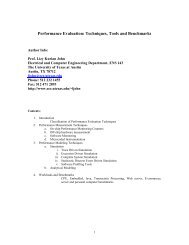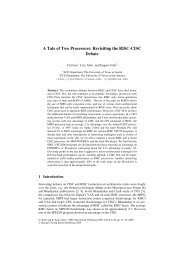- Page 1 and 2:
Copyright by William Lloyd Bircher
- Page 3 and 4:
Predictive Power Management for Mul
- Page 5 and 6:
Acknowledgements I would like to th
- Page 7 and 8:
Predictive Power Management for Mul
- Page 9 and 10:
Table of Contents Chapter 1 Introdu
- Page 11 and 12:
5.3.6 Memory ......................
- Page 13 and 14:
List of Tables Table 1.1 Windows Vi
- Page 15 and 16:
List of Figures Figure 1.1 CPU Core
- Page 17 and 18:
Chapter 1 Introduction Computing sy
- Page 19 and 20:
increases the overhead of adaptatio
- Page 21 and 22:
suboptimal from a power and perform
- Page 23 and 24:
Active Core Activity Idle except fo
- Page 25 and 26:
4. Design a predictive power manage
- Page 27 and 28:
1.7 Organization This dissertation
- Page 29 and 30:
Chapter 2 Methodology The developme
- Page 31 and 32:
2.1.2 Subsystem-Level Power in a Se
- Page 33 and 34:
The main components are subsystem p
- Page 35 and 36:
Table 2.4 Laptop System Description
- Page 37 and 38:
2.3 Performance Counter Sampling To
- Page 39 and 40:
instruction streams that exercise a
- Page 41 and 42:
the power trace to the PMC trace co
- Page 43 and 44:
The first bar in Figure 3.1 “Fetc
- Page 45 and 46:
Table 3.4 Instruction Linear Regres
- Page 47 and 48:
long time to complete, more aggress
- Page 49 and 50:
power adaptations as c-states. Thes
- Page 51 and 52:
Core Power (Watts) 60 50 40 30 20 1
- Page 53 and 54:
The difference between C0-Idle and
- Page 55 and 56:
case error is 3.3%. Alternatively s
- Page 57 and 58:
3. Based on basic domain knowledge,
- Page 59 and 60:
3.6 Summary This section describes
- Page 61 and 62:
Power (Watts) 30 25 20 15 10 5 0 Co
- Page 63 and 64:
workloads become more memory-bound,
- Page 65 and 66:
At the other extreme, the productiv
- Page 67 and 68:
processor. In both platforms the to
- Page 69 and 70:
Table 4.1 Subsystem Power Standard
- Page 71 and 72:
the case of I/O, the observed workl
- Page 73 and 74:
average distribution. The apparent
- Page 75 and 76:
Table 4.4 Workload Phase Classifica
- Page 77 and 78:
Frequency 1 10 100 1000 PhaseLength
- Page 79 and 80:
power management, it is shown that
- Page 81 and 82:
power measurement hardware for mult
- Page 83 and 84:
memory. Since the number of main me
- Page 85 and 86:
TLB Misses - Loads/stores that miss
- Page 87 and 88:
The form of the subsystem power mod
- Page 89 and 90:
5.2.2 Memory This section considers
- Page 91 and 92:
prefetch traffic does increase afte
- Page 93 and 94:
average access time to the distant
- Page 95 and 96:
Watts Figure 5.6 Disk Power Model (
- Page 97 and 98:
exhibits little variation in power
- Page 99 and 100:
The memory model averaged about 9%
- Page 101 and 102:
efficiency rather than performance.
- Page 103 and 104:
through the application GUI. The nu
- Page 105 and 106:
1 data cache access rate dominates
- Page 107 and 108:
periods of disconnect, cache snoop
- Page 109 and 110:
5.3.4 CPU To test the extensibility
- Page 111 and 112:
Despite this, high accuracy of less
- Page 113 and 114:
Light activity yields higher precha
- Page 115 and 116:
5.3.8 Chipset The Chipset power mod
- Page 117 and 118:
applied to the GPU core logic, larg
- Page 119 and 120:
Chapter 6 Performance Effects of Dy
- Page 121 and 122: can be considered as predictors whi
- Page 123 and 124: improvement for low idle core frequ
- Page 125 and 126: 6.1.5 Direct Performance Effects Si
- Page 127 and 128: of SPEC CPU2000 workloads, almost n
- Page 129 and 130: adjusting a hysteresis timer. The t
- Page 131 and 132: increase/decrease time. Since the i
- Page 133 and 134: In order to reduce p-state performa
- Page 135 and 136: performance loss and power consumpt
- Page 137 and 138: eactive scheme used in Windows Vist
- Page 139 and 140: Watts Watts Watts Watts Watts 150 1
- Page 141 and 142: 7.2 Commercial DVFS Algorithm Exist
- Page 143 and 144: of idle-active transitions in the c
- Page 145 and 146: workload/operating systems adds and
- Page 147 and 148: instructions. In APCI[Ac07] termino
- Page 149 and 150: confidence level will drop below a
- Page 151 and 152: First, prediction accuracy is consi
- Page 153 and 154: coverage of 43% and accuracy over 9
- Page 155 and 156: which corresponds to the DVFS sched
- Page 157 and 158: Table 7.6: SYSmark 2007 Power and P
- Page 159 and 160: In this case the predictor achieves
- Page 161 and 162: 2007 power consumption contains man
- Page 163 and 164: Chapter 8 Related Research This sec
- Page 165 and 166: 8.2 System-Level Power Characteriza
- Page 167 and 168: prediction scheme in this dissertat
- Page 169 and 170: Chapter 9 Conclusions and Future Wo
- Page 171: the duration of power and performan
- Page 175 and 176: [BiJo06-1] W. L. Bircher and L. Joh
- Page 177 and 178: the 2005 ACM SIGMETRICS Internation
- Page 179 and 180: [HaKe07] H. Hanson, S.W. Keckler, K
- Page 181 and 182: [JoMa01] R. Joseph and M. Martonosi
- Page 183 and 184: [LiBr05] Y. Li, D. Brooks, Z. Hu, a
- Page 185 and 186: [Os06] Open Source Development Lab,
- Page 187 and 188: [WaCh08] X. Wang and M. Chen. Clust
- Page 189 and 190: [PiSh01] P. Pillai and K. G. Shin.




